Richard Nixon
Richard Nixon was the 37th President of the United States from 1969 until 1974, when he resigned from office, the only U.S. president to do so. He had previously served as the 36th Vice President of the United States from 1953 to 1961, and prior to that as a U.S. Representative and also Senator from California.
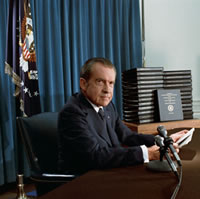 Nixon was born in Yorba Linda, California. After completing his undergraduate studies at Whittier College, he graduated from Duke University School of Law in 1937 and returned to California to practice law. He and his wife Pat moved to Washington in 1942 to work for the federal government. He subsequently served on active duty in the U.S. Navy Reserve during World War II. Nixon was elected to the House of Representatives in 1946 and to the Senate in 1950. His pursuit of the Hiss Case established his reputation as a leading anti-communist and elevated him to national prominence. He was the running mate of Dwight D. Eisenhower, the Republican Party presidential nominee in the 1952 election. Nixon served for eight years as vice president – at 40, the second-youngest vice president in history. He waged an unsuccessful presidential campaign in 1960, narrowly losing to John F. Kennedy, and lost a race for Governor of California to Pat Brown in 1962. In 1968, he ran for the presidency again and was elected, defeating incumbent Vice President Hubert Humphrey.
Nixon was born in Yorba Linda, California. After completing his undergraduate studies at Whittier College, he graduated from Duke University School of Law in 1937 and returned to California to practice law. He and his wife Pat moved to Washington in 1942 to work for the federal government. He subsequently served on active duty in the U.S. Navy Reserve during World War II. Nixon was elected to the House of Representatives in 1946 and to the Senate in 1950. His pursuit of the Hiss Case established his reputation as a leading anti-communist and elevated him to national prominence. He was the running mate of Dwight D. Eisenhower, the Republican Party presidential nominee in the 1952 election. Nixon served for eight years as vice president – at 40, the second-youngest vice president in history. He waged an unsuccessful presidential campaign in 1960, narrowly losing to John F. Kennedy, and lost a race for Governor of California to Pat Brown in 1962. In 1968, he ran for the presidency again and was elected, defeating incumbent Vice President Hubert Humphrey.
Nixon ended American involvement in the war in Vietnam in 1973 and brought the American POWs home, and ended the military draft. Nixon’s visit to the People’s Republic of China in 1972 eventually led to diplomatic relations between the two nations, and he initiated détente and the Anti-Ballistic Missile Treaty with the Soviet Union the same year. His administration generally transferred power from Washington D.C. to the states. He imposed wage and price controls for ninety days, enforced desegregation of Southern schools and established the Environmental Protection Agency. Nixon also presided over the Apollo 11 moon landing, which signaled the end of the moon race.
He was reelected in one of the largest electoral landslides in U.S. history in 1972 when he defeated George McGovern.
In his second term, Nixon ordered an airlift to resupply Israeli losses in the Yom Kippur War, resulting in the restart of the Middle East peace process and an oil crisis at home. The Nixon administration supported a coup in Chile that ousted the government of Salvador Allende and propelled Augusto Pinochet to power. By late 1973, the Watergate scandal escalated, costing Nixon much of his political support. On August 9, 1974, he resigned in the face of almost certain impeachment and removal from office. After his resignation, he was issued a pardon by his successor, Gerald Ford. In 20 years of retirement, Nixon wrote nine books and undertook many foreign trips, helping to rehabilitate his image into that of elder statesman. He suffered a debilitating stroke on April 18, 1994 and died four days later at the age of 81.
Chicago Seven
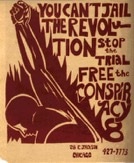 February 18 1970, A jury finds the Chicago Seven defendants not guilty of conspiring to incite a riot, in charges stemming from the violence at the 1968 Democratic National Convention.
February 18 1970, A jury finds the Chicago Seven defendants not guilty of conspiring to incite a riot, in charges stemming from the violence at the 1968 Democratic National Convention.
Five of the defendants are found guilty on the lesser charge of crossing state lines to incite a riot.
Earth Day
March 21 1970
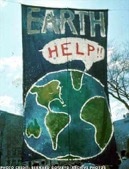 The first Earth Day proclamation is issued by San Francisco Mayor Joseph Alioto.
The first Earth Day proclamation is issued by San Francisco Mayor Joseph Alioto.
April 22 – The first Earth Day is celebrated in the U.S.
An annual event celebrated on April 22. Worldwide, various events are held to demonstrate support for environmental protection. First celebrated in 1970, Earth Day events in more than 193 countries[1] are now coordinated globally by the Earth Day Network
Beatles Break up
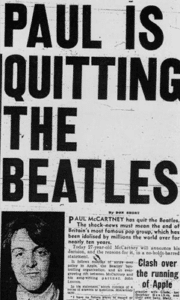
April 10, 1970, Paul McCartney announces that he is leaving The Beatles for personal and professional reasons.
Apollo 13
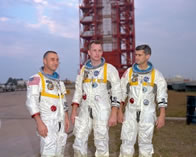 Apollo 13 was the seventh manned mission in the Apollo space program and the third intended to land on the Moon. The craft was launched on April 11, 1970, at 13:13 CST (19:13 UTC) from the Kennedy Space Center, Florida, but the lunar landing was aborted after an oxygen tank exploded two days later, crippling the Service Module (SM) upon which the Command Module (CM) had depended. Despite great hardship caused by limited power, loss of cabin heat, shortage of potable water, and the critical need to make makeshift repairs to the carbon dioxide removal system, the crew returned safely to Earth on April 17, 1970, six days after launch.
Apollo 13 was the seventh manned mission in the Apollo space program and the third intended to land on the Moon. The craft was launched on April 11, 1970, at 13:13 CST (19:13 UTC) from the Kennedy Space Center, Florida, but the lunar landing was aborted after an oxygen tank exploded two days later, crippling the Service Module (SM) upon which the Command Module (CM) had depended. Despite great hardship caused by limited power, loss of cabin heat, shortage of potable water, and the critical need to make makeshift repairs to the carbon dioxide removal system, the crew returned safely to Earth on April 17, 1970, six days after launch.
The flight passed the far side of the Moon at an altitude of 254 kilometers (137 nautical miles) above the lunar surface, and 400,171 km (248,655 mi) from Earth, a spaceflight record marking the farthest humans have ever traveled from Earth. The mission was commanded by James A. Lovell with John L. “Jack” Swigert as Command Module Pilot and Fred W. Haise as Lunar Module Pilot. Swigert was a late replacement for the original CM pilot Ken Mattingly, who was grounded by the flight surgeon after exposure to German measles.
Kent State Shooting
Kent State Shooting were the shootings of unarmed college students protesting the Vietnam War at Kent State University in Kent, Ohio, by members of the Ohio National Guard on May 4, 1970. Twenty-nine guardsmen fired approximately 67 rounds over a period of 13 seconds, killing four students and wounding nine others, one of whom suffered permanent paralysis.
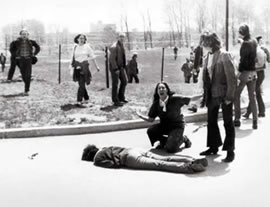 Some of the students who were shot had been protesting the Cambodian Campaign, which President Richard Nixon announced during a television address on April 30. Other students who were shot had been walking nearby or observing the protest from a distance.
Some of the students who were shot had been protesting the Cambodian Campaign, which President Richard Nixon announced during a television address on April 30. Other students who were shot had been walking nearby or observing the protest from a distance.
There was a significant national response to the shootings: hundreds of universities, colleges, and high schools closed throughout the United States due to a student strike of 4 million students, and the event further affected public opinion, at an already socially contentious time, over the role of the United States in the Vietnam War
Led Zeppelin
Led Zeppelin were an English rock band formed in London in 1968. The group consisted of guitarist Jimmy Page, singer Robert Plant, bassist and keyboardist John Paul Jones, and drummer John Bonham. The band’s heavy, guitar-driven sound has led them to be cited as one of the progenitors of heavy metal, though their unique style drew from a wide variety of influences, including blues, psychedelia, and folk music.
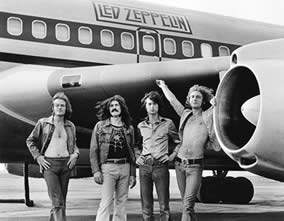 After changing their name from the New Yardbirds, Led Zeppelin signed a deal with Atlantic Records that afforded them considerable artistic freedom. Although the group was initially unpopular with critics, they achieved significant commercial success with albums such as Led Zeppelin (1969), Led Zeppelin II (1969), Led Zeppelin III (1970), Led Zeppelin IV (1971), Houses of the Holy (1973), and Physical Graffiti (1975). Their fourth album, which features the song “Stairway to Heaven”, is among the most popular and influential works in rock music, and it helped to secure the group’s popularity.
After changing their name from the New Yardbirds, Led Zeppelin signed a deal with Atlantic Records that afforded them considerable artistic freedom. Although the group was initially unpopular with critics, they achieved significant commercial success with albums such as Led Zeppelin (1969), Led Zeppelin II (1969), Led Zeppelin III (1970), Led Zeppelin IV (1971), Houses of the Holy (1973), and Physical Graffiti (1975). Their fourth album, which features the song “Stairway to Heaven”, is among the most popular and influential works in rock music, and it helped to secure the group’s popularity.
Page wrote most of Led Zeppelin’s music, particularly early in their career, while Plant generally supplied the lyrics. Jones’ keyboard-based compositions later became central to the group’s catalogue, which featured increasing experimentation. The latter half of their career saw a series of record-breaking tours that earned the group a reputation for excess and debauchery. Although they remained commercially and critically successful, their output and touring schedule were limited during the late 1970s, and the group disbanded following Bonham’s death from alcohol-related asphyxia in 1980.
Led Zeppelin are widely considered one of the most successful, innovative, and influential rock groups in history. They are one of the best-selling music artists in the history of audio recording; various sources estimate the group’s record sales at 200 to 300 million units worldwide. With RIAA-certified sales of 111.5 million units, they are the second-best-selling band in the US. Each of their nine studio albums placed in the top 10 of the Billboard album chart and six reached the number-one spot. They achieved eight consecutive UK number-one albums. Rolling Stone magazine described them as “the heaviest band of all time”, “the biggest band of the Seventies”, and “unquestionably one of the most enduring bands in rock history”. They were inducted into the Rock and Roll Hall of Fame in 1995; the museum’s biography of the band states that they were “as influential” during the 1970s as the Beatles were during the 1960s.
The Isle of the Wright Festival 1970
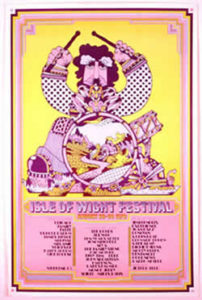 The Isle of Wight Festival 1970 was held between 26 and 31 August 1970 at Afton Down, an area on the western side of the Isle of Wight. It was the last of three consecutive music festivals to take place on the island between 1968 and 1970 and widely acknowledged as the largest musical event of its time, greater than the attendance of Woodstock.
The Isle of Wight Festival 1970 was held between 26 and 31 August 1970 at Afton Down, an area on the western side of the Isle of Wight. It was the last of three consecutive music festivals to take place on the island between 1968 and 1970 and widely acknowledged as the largest musical event of its time, greater than the attendance of Woodstock.
Although estimates vary, the Guinness World Records estimated 600,000, possibly 700,000 people attended. It was organised and promoted by local brothers, Ron and Ray Foulk through their company Fiery Creations Ltd and their brother Bill Foulk. Ron Smith was site manager and Rikki Farr acted as compere.
The preceding Isle of Wight Festivals, also promoted by the Foulks, had already gained a good reputation in 1968 and 1969 by featuring acts such as Jefferson Airplane, T. Rex, The Move, The Pretty Things, Joe Cocker, The Moody Blues (performed at the 1969 festival), The Who, and Bob Dylan in his first performance since his 1966 motorcycle accident.
All in the Family
All in the Family is an American sitcom TV-series that was originally broadcast on the CBS television network for nine seasons, from January 1971 to April 1979. The following September, it was replaced by Archie Bunker’s Place, which picked up where All in the Family had ended and ran for four more seasons.
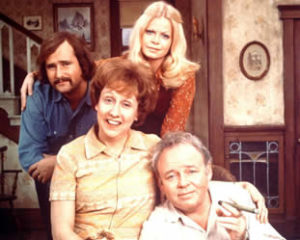 All in the Family was produced by Norman Lear and Bud Yorkin. It starred Carroll O’Connor, Jean Stapleton, Sally Struthers, and Rob Reiner. The show revolves around the life of a working-class bigot and his family. The show broke ground in its depiction of issues previously considered unsuitable for a U.S. network television comedy, such as racism, infidelity, homosexuality, women’s liberation, rape, religion, miscarriages, abortion, breast cancer, the Vietnam War, menopause, and impotence. Through depicting these controversial issues, the series became arguably one of television’s most influential comedic programs, as it injected the sitcom format with more dramatic moments and realistic, topical conflicts.
All in the Family was produced by Norman Lear and Bud Yorkin. It starred Carroll O’Connor, Jean Stapleton, Sally Struthers, and Rob Reiner. The show revolves around the life of a working-class bigot and his family. The show broke ground in its depiction of issues previously considered unsuitable for a U.S. network television comedy, such as racism, infidelity, homosexuality, women’s liberation, rape, religion, miscarriages, abortion, breast cancer, the Vietnam War, menopause, and impotence. Through depicting these controversial issues, the series became arguably one of television’s most influential comedic programs, as it injected the sitcom format with more dramatic moments and realistic, topical conflicts.
John Lennon
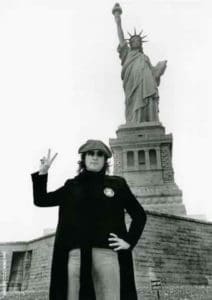 John Lennon was an English singer, songwriter, musician, and activist who co-founded the Beatles, the most commercially successful and musically influential band in the history of popular music. He and fellow member Paul McCartney formed a much-celebrated songwriting partnership.
John Lennon was an English singer, songwriter, musician, and activist who co-founded the Beatles, the most commercially successful and musically influential band in the history of popular music. He and fellow member Paul McCartney formed a much-celebrated songwriting partnership.
Born and raised in Liverpool, Lennon became involved in the skiffle craze as a teenager; his first band, the Quarrymen, was named the Silver Beatles, and finally evolved into the Beatles in 1960. When the group disbanded in 1970, Lennon embarked on a sporadic solo career that produced albums including John Lennon/Plastic Ono Band and Imagine, and songs such as “Give Peace a Chance”, “Working Class Hero”, and “Imagine”. After he married Yoko Ono in 1969, he added “Ono” as one of his middle names. Lennon disengaged himself from the music business in 1975 to raise his infant son Sean, but re-emerged with Ono in 1980 with the new album Double Fantasy. He was shot and killed in front of his Manhattan apartment three weeks after its release.
Lennon revealed a rebellious nature and acerbic wit in his music, writing, drawings, on film and in interviews. Controversial through his political and peace activism, he moved from London to Manhattan in 1971, where his criticism of the Vietnam War resulted in a lengthy attempt by the Nixon administration to deport him. Some of his songs were adopted as anthems by the anti-war movement and the larger counterculture.
Concert for Bangladesh
Concert for Bangladesh was the collective name for two benefit concerts organized by former Beatles lead guitarist George Harrison and Indian sitar master Ravi Shankar. The concerts were held at 2:30 and 8:00 pm on Sunday, 1 August 1971, at Madison Square Garden in New York City. The shows were organized to raise international awareness and fund relief efforts for refugees from East Pakistan (now Bangladesh), following the Bangladesh Liberation War-related genocide. The concerts were followed by a bestselling live album, a boxed three-record set, and Apple Films’ concert documentary, which opened in cinemas in the spring of 1972.
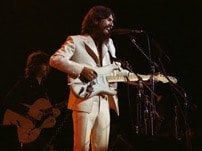 The event was the first-ever benefit concert of such a magnitude and featured a supergroup of performers that included Harrison, fellow ex-Beatle Ringo Starr, Bob Dylan, Eric Clapton, Billy Preston, Leon Russell and the band Badfinger. In addition, Shankar and Ali Akbar Khan – both of whom had ancestral roots in Bangladesh – performed an opening set of Indian classical music. Decades later, Shankar would say of the overwhelming success of the event: “In one day, the whole world knew the name of Bangladesh. It was a fantastic occasion …”
The event was the first-ever benefit concert of such a magnitude and featured a supergroup of performers that included Harrison, fellow ex-Beatle Ringo Starr, Bob Dylan, Eric Clapton, Billy Preston, Leon Russell and the band Badfinger. In addition, Shankar and Ali Akbar Khan – both of whom had ancestral roots in Bangladesh – performed an opening set of Indian classical music. Decades later, Shankar would say of the overwhelming success of the event: “In one day, the whole world knew the name of Bangladesh. It was a fantastic occasion …”
The concerts were attended by a total of 40,000 people, and raised close to US$250,000 for Bangladesh relief, which was administered by UNICEF. Although the project was subsequently marred by financial problems – a result of the pioneering nature of the venture – the Concert for Bangladesh is recognized as a successful and influential humanitarian aid project, generating both awareness and considerable funds as well as providing valuable lessons and inspiration for projects that followed, notably Live Aid. By 1985, through revenue raised from the Concert for Bangladesh live album and film, an estimated $12 million had been sent to Bangladesh in relief.
Anwar Sadat
Anwar Sadat was the third President of Egypt, serving from 15 October 1970 until his assassination by fundamentalist army officers on 6 October 1981. Sadat was a senior member of the Free Officers who overthrew King Farouk in the Egyptian Revolution of 1952, and a close confidant of President Gamal Abdel Nasser, under whom he served as Vice President twice and whom he succeeded as President in 1970.
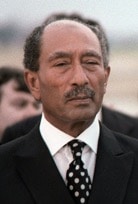 In his eleven years as president, he changed Egypt’s trajectory, departing from many of the political and economic tenets of Nasserism, re-instituting a multi-party system, and launching the Infitah economic policy. As President, he led Egypt in the Yom Kippur War of 1973 to regain Egypt’s Sinai Peninsula, which Israel had occupied since the Six-Day War of 1967, making him a hero in Egypt and, for a time, the wider Arab World. Afterwards, he engaged in negotiations with Israel, culminating in the Egypt–Israel Peace Treaty; this won him and Israeli Prime Minister Menachem Begin the Nobel Peace Prize, making Sadat the first Muslim Nobel laureate.
In his eleven years as president, he changed Egypt’s trajectory, departing from many of the political and economic tenets of Nasserism, re-instituting a multi-party system, and launching the Infitah economic policy. As President, he led Egypt in the Yom Kippur War of 1973 to regain Egypt’s Sinai Peninsula, which Israel had occupied since the Six-Day War of 1967, making him a hero in Egypt and, for a time, the wider Arab World. Afterwards, he engaged in negotiations with Israel, culminating in the Egypt–Israel Peace Treaty; this won him and Israeli Prime Minister Menachem Begin the Nobel Peace Prize, making Sadat the first Muslim Nobel laureate.
Though reaction to the treaty—which resulted in the return of Sinai to Egypt—was generally favorable among Egyptians, it was rejected by the country’s Muslim Brotherhood, which felt Sadat had abandoned efforts to ensure a Palestinian state. With the exception of Sudan, the Arab world and the Palestine Liberation Organization (PLO) strongly opposed Sadat’s efforts to make a separate peace with Israel without prior consultations with the Arab states.
His refusal to reconcile with them over the Palestinian issue resulted in Egypt being suspended from the Arab League from 1979 to 1989. The peace treaty was also one of the primary factors that led to his assassination.
John F. Kennedy Center for the Performing Arts
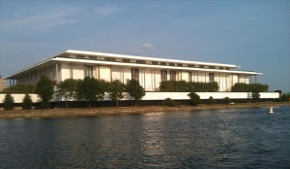
September 8 – In Washington, D.C., the John F. Kennedy Center for the Performing Arts is inaugurated, with the opening feature being the premiere of Leonard Bernstein’s Mass.
Elton John
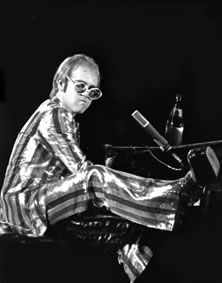 Elton John is an English singer, pianist, and composer. He has worked with lyricist Bernie Taupin as his songwriting partner since 1967; they have collaborated on more than 30 albums to date. In his five-decade career Elton John has sold more than 300 million records, making him one of the best-selling music artists in the world.
Elton John is an English singer, pianist, and composer. He has worked with lyricist Bernie Taupin as his songwriting partner since 1967; they have collaborated on more than 30 albums to date. In his five-decade career Elton John has sold more than 300 million records, making him one of the best-selling music artists in the world.
He has more than fifty Top 40 hits, including seven consecutive No. 1 US albums, 58 Billboard Top 40 singles, 27 Top 10, four No. 2 and nine No. 1. For 31 consecutive years (1970–2000) he had at least one song in the Billboard Hot 100. His tribute single, re-penned in dedication to the late Princess Diana, “Candle in the Wind 1997” sold over 33 million copies worldwide and is the best-selling single in the history of the UK and US singles charts.
He has also composed music, produced records, and has occasionally acted in films. John owned Watford Football Club from 1976 to 1987, and 1997 to 2002. He is an honorary Life President of the club, and in 2014 had a stand named after him at the club’s home stadium.
Paul McCartney/Wings
Paul McCartney/Wings were an Anglo-American rock band formed in 1971 by former Beatle Paul McCartney with his wife Linda on keyboards, session drummer Denny Seiwell, and former Moody Blues guitarist Denny Laine. Wings were noted for frequent personnel changes as well as commercial success, going through three lead guitarists and four drummers. However, the core trio of the McCartneys and Laine remained intact throughout the group’s existence.
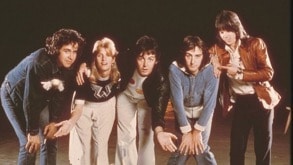 Created following the McCartneys’ 1971 album Ram, the band’s first two albums, Wild Life and Red Rose Speedway (the latter featuring guitarist Henry McCullough), were viewed as artistic disappointments beside Paul McCartney’s work with the Beatles. After the release of the title track of the James Bond movie Live and Let Die, McCullough and Seiwell resigned from the band. The McCartneys and Laine then released 1973’s Band on the Run, a commercial and critical success that spawned two top ten singles in “Jet” and the title track. Following that album, the band recruited guitarist Jimmy McCulloch and drummer Geoff Britton, only for Britton to quit shortly afterwards and be replaced by Joe English. With the new line-up, Wings released Venus and Mars, which included the US number one single “Listen to What the Man Said”, and undertook a highly successful world tour over 1975–76. Intended as more of a group effort, Wings at the Speed of Sound was issued midway through the tour and featured the hit singles “Silly Love Songs” and “Let ‘Em In”.
Created following the McCartneys’ 1971 album Ram, the band’s first two albums, Wild Life and Red Rose Speedway (the latter featuring guitarist Henry McCullough), were viewed as artistic disappointments beside Paul McCartney’s work with the Beatles. After the release of the title track of the James Bond movie Live and Let Die, McCullough and Seiwell resigned from the band. The McCartneys and Laine then released 1973’s Band on the Run, a commercial and critical success that spawned two top ten singles in “Jet” and the title track. Following that album, the band recruited guitarist Jimmy McCulloch and drummer Geoff Britton, only for Britton to quit shortly afterwards and be replaced by Joe English. With the new line-up, Wings released Venus and Mars, which included the US number one single “Listen to What the Man Said”, and undertook a highly successful world tour over 1975–76. Intended as more of a group effort, Wings at the Speed of Sound was issued midway through the tour and featured the hit singles “Silly Love Songs” and “Let ‘Em In”.
In 1977, the band earned their only UK number one single, with “Mull of Kintyre”, which became the then-best selling UK single in history. Wings experienced another line-up shuffle, however, with both McCulloch and English departing before the release of the group’s 1978 album London Town. The McCartneys and Laine again added new members, recruiting guitarist Laurence Juber and drummer Steve Holley. The resulting album, Back to the Egg, was a relative flop, with its singles under-performing and the critical reception negative. During the supporting tour, Paul McCartney was arrested in Japan for cannabis possession, putting the band on hold. Despite a final US number one, the live version of McCartney’s solo single “Coming Up”, after Laine departing from the band, Wings discontinued for good in 1981.
Patton (film)
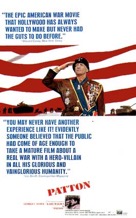 Patton (film) is a 1970 American epic biographical war film about U.S. General George S. Patton during World War II. It stars George C. Scott, Karl Malden, Michael Bates and Karl Michael Vogler. It was directed by Franklin J. Schaffner from a script by Francis Ford Coppola and Edmund H. North, who based their screenplay on the biography Patton: Ordeal and Triumph by Ladislas Farago and Omar Bradley’s memoir A Soldier’s Story. The film was shot in 65 mm Dimension 150 by cinematographer Fred J. Koenekamp and has a music score by Jerry Goldsmith.
Patton (film) is a 1970 American epic biographical war film about U.S. General George S. Patton during World War II. It stars George C. Scott, Karl Malden, Michael Bates and Karl Michael Vogler. It was directed by Franklin J. Schaffner from a script by Francis Ford Coppola and Edmund H. North, who based their screenplay on the biography Patton: Ordeal and Triumph by Ladislas Farago and Omar Bradley’s memoir A Soldier’s Story. The film was shot in 65 mm Dimension 150 by cinematographer Fred J. Koenekamp and has a music score by Jerry Goldsmith.
Patton won seven Academy Awards, including Best Picture, Best Director and Best Original Screenplay. Scott won Best Actor for his portrayal of General Patton, but declined to accept the award.The opening monologue, delivered by George C. Scott as General Patton with an enormous American flag behind him, remains an iconic and often quoted image in film
